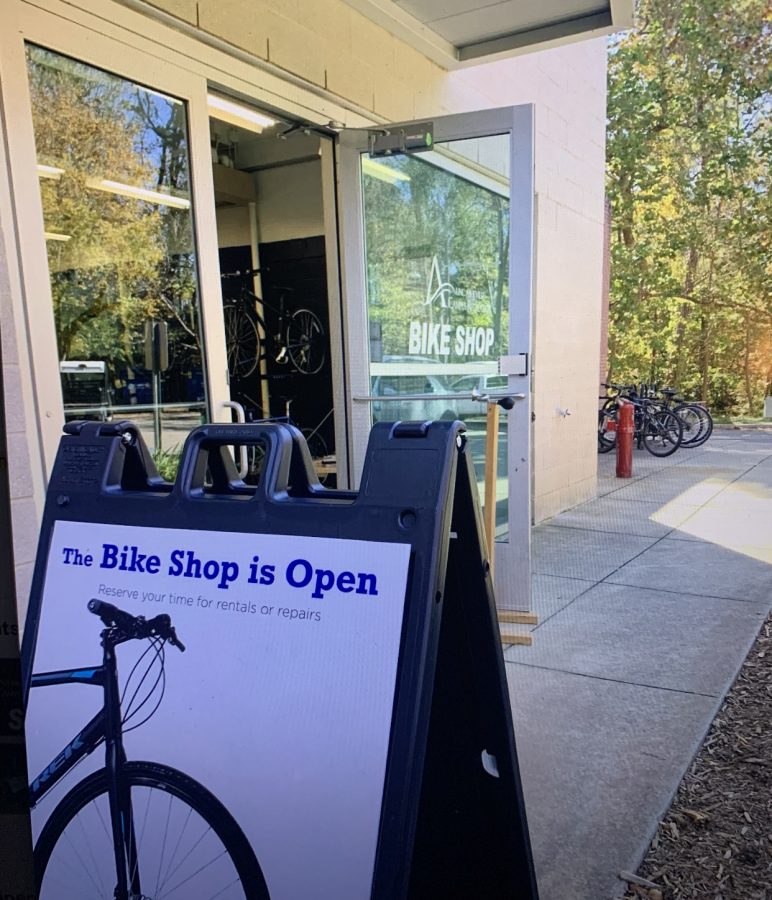UNCA’s Campus Recreation Bike Shop and biking in Asheville
UNCA Campus Recreation Bike Shop.
February 8, 2023
Riding a bike is an economically and environmentally friendly mode of transport utilized by many in the Asheville community. Additionally, it can be a source of exercise, leisure or relaxation.
In November, with the help of Director of Sustainability Alison Ormsby and UNC Asheville junior Joe Franco, UNCA was named as a Bronze Bicycle Friendly University by the League of American Bicyclists, commending the effort the school and its students have put in.
“We figured getting that kind of acknowledgement would be a great way to both get more people riding their bikes on campus as well as improve the future of biking at UNCA,” Franco said. “UNCA has a lot going for it in that way, but there’s also a long way to go.”
Franco is an employee at UNCA’s Campus Recreation Bike Shop, which operates at the bottom of Highsmith Student Union. The shop offers rental and repair services to students, faculty and staff. Commuter and mountain bikes are available to rent, and personal bike repairs are also available. Currently, it’s open from 12-3 p.m. on Monday, Wednesday and Friday, with plans to expand hours as the season warms up and more cyclists are getting out.
“Our commuter bike rentals are free to all students and available at an affordable rate for faculty and staff. For our repairs and tune-ups, the labor is free, we just charge for parts,” Franco said.
UNCA sophomore Cole Bruner has used the services of the bike shop to great success.
“Working with the bike shop was a great experience. I rented a good bike and had fun riding it until I got my own bike on campus, which I was able to get fixed at the bike shop. Frankly, I think this is an underutilized resource by students,” Bruner said.
Franco, an avid biker himself, finds enjoyment in biking the winding greenways, which span from downtown to right next to campus.
“The Reed Creek and Glenn’s Creek Greenways are really nice, enjoyable places to ride your bike,” Franco said. “They’re safe and separate from the road, scenic and well maintained.”
Bruner also finds comfort in biking in areas where there is limited or zero direct interaction with cars.
“I enjoy biking up to the observatory and around that area, as well as going to the River Arts District where there are safe places to bike due to infrastructure. These are the only two significant places I’ve been able to reach on bike without major hazard to my own safety traffic wise,” Bruner said.
The interaction between cars and bikes is one that consistently sparks much controversy nationwide, with Asheville being no exception. Many roads do not have bike lanes or any sort of bike infrastructure. This can create dangerous situations for bikers.
“There definitely is a sort of ‘war’ aspect between cars and bikes in many cases, and a lot of that comes from not having proper bike infrastructure,” said Franco. “Protected bike lanes are what we should really strive for, where there’s some sort of barrier between bikes and cars. The vast majority of serious bike accidents involve cars, so limiting interactions between the two as much as possible would be a great step in encouraging the population to bike. People want to feel safe and comfortable.”
Bruner echoes these sentiments and has ideas for biking to become a more fluid means of travel in the city.
“I feel biking is a good method of transportation but the infrastructure needs to be more concrete. With the mountain geography, biking is already made difficult, so having dedicated spaces for bikes would be nice. There are some places where it’s hard to bike to without additional help,” Bruner said.
When bike lanes aren’t present, it’s easy for car drivers to feel extremely inconvenienced by bikes on the road. Much anger can be directed toward bikers and impatient and rash decisions can cause life-threatening scenarios.
“We need to build a culture of drivers that are more accepting and comfortable with bikes to acknowledge our roads aren’t only built for cars, they’re built for people,” Franco said. “I do know sometimes cyclists have a part to play in the conflict, with some blowing through red lights or fanning out in the middle of the road and not letting cars pass. Both sides need to attempt to understand each other and coexist as best as possible.”
For those interested in getting more involved with bikes on campus, Outdoor Programs is offering a Mountain Biking trip on April 8 and the Bike Shop will be offering bike riding lessons during the week of Greenfest, March 27 through April 2.


















